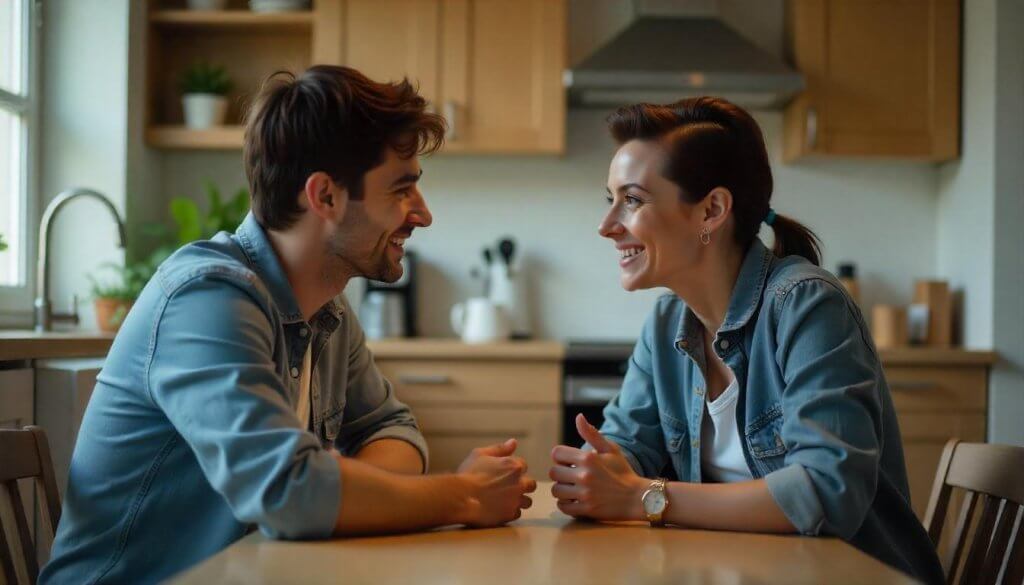Romantik ilişkiler, son derece kişisel olmakla birlikte, bir boşlukta var olmazlar. Bunun yerine, her bir partnerin hayatını dolduran sayısız bireyden -arkadaşlar, aile, meslektaşlar ve topluluk üyeleri- etkilenen daha geniş bir sosyal dokuya karmaşık bir şekilde dokunurlar. Toplu olarak sosyal çevreler olarak bilinen bu dış bağlantılar, romantik bir ortaklığın sağlığı, dinamikleri ve uzun ömürlülüğü üzerinde derin ve genellikle hafife alınan bir etkiye sahiptir. Paha biçilmez bir destek sunmaktan öngörülemeyen zorluklar çıkarmaya kadar, sevgi ve dış sosyal bağlar arasındaki etkileşim ilişkisel esenliğin kritik bir yönüdür. Bu nedenle, aşkın ve dışsal sosyal bağların nüanslı etkisini anlamak Sosyal Çemberler İlişkiler kalıcı bir uyum arayan her çift için hayati önem taşır.
Gerçekten de, ister aktif bir şekilde benimsensin isterse inceden dirensin, bu çevresel ilişkiler algıları şekillendirir, tavsiye sağlar (talep edilsin veya edilmesin) ve temel ortaklık için mevcut zaman ve enerjiyi etkiler. Bu makale, çevre ilişkilerinin derin ve çoğu zaman hafife alınan etkisini araştırmaktadır. Sosyal Çemberler İlişkiler romantik ortaklıklar üzerine. Bireysel ve ortak arkadaşlıkların, aile bağlantılarının ve daha geniş topluluk bağlarının bir çiftin bağını nasıl güçlendirebileceğini veya istemeden nasıl zorlayabileceğini ve sonuçta dayanıklılığını, mutluluğunu ve genel yörüngesini nasıl şekillendirebileceğini araştırıyor. Çiftler, bu dış etkilere karşı dikkatli davranarak onları aşkları için güçlü müttefiklere dönüştürebilirler.
İç İçe Geçmiş Dünyalar: Bireysel ve Ortak Çemberler
Bireysel ve ortak sosyal çevreler arasındaki ayrımı ve etkileşimi anlamak, bunların romantik bir ilişki üzerindeki etkilerini takdir etmek için esastır. Bunlar birbirini dışlayan değil, aksine birbiriyle bağlantılı etki alanlarıdır.
İlk olarak, her bir partner ilişkiye kendi yerleşik bireysel sosyal çevrelerini getirir. Bunlar, romantik birliktelik başlamadan önce geliştirdikleri ve genellikle kimliklerinin ve kişisel tarihlerinin önemli bir bölümünü temsil eden arkadaşları ve tanıdıklarıdır. Ancak zamanla yeni bir oluşum ortaya çıkmaya başlar: ortak sosyal çevre. Bu, her iki partnerin de tanıdığı ve birlikte eğlendiği, genellikle "çift arkadaşı" haline gelen veya yeni ortak faaliyetler içinde oluşan arkadaşlardan oluşur.
Ayrıca, hem bireysel hem de ortak çevrelerin sürdürülmesinin önemi yadsınamaz. Ortak bir sosyal yaşam, ortak deneyimleri ve bir çift olarak aidiyet duygusunu teşvik ederken, bireysel arkadaşlıklar kişisel alan, farklı bakış açıları ve her bir eşin özerkliğini besleyen bağımsız destek sağlar. Bu çevreler arasındaki sürekli etkileşim ve etki dinamiktir. Örneğin, ortak bir arkadaşla yaşanan zorlu bir deneyim her iki partneri de etkileyebilirken, bireysel bir arkadaştan gelen haberler bir partnerin ruh halini veya bakış açısını etkileyebilir ve daha sonra çifti etkileyebilir. Bu karmaşık dansın farkına varmak, ilişkinin gücünden yararlanmanın anahtarıdır. Sosyal Çemberler İlişkiler.
Destekleyici Sosyal Çevrelerin Olumlu Etkileri
Ne zaman Sosyal Çemberler İlişkiler Sağlıklı ve destekleyici olduklarında, güçlü bir dış kaynak olarak hareket ederek ve iç dinamikleri geliştirerek romantik bir ortaklığı derinden güçlendirebilirler.
İlk olarak, destekleyici arkadaşlar ve aile genellikle ilişkinin kendisi için paha biçilmez bir doğrulama ve teşvik sağlar. Eşiniz ya da ilişkiniz hakkında dışarıdan saygın kişilerden olumlu onaylar duymak, özellikle zor zamanlarda güveni pekiştirebilir ve bağlılığı güçlendirebilir. Ayrıca, kişisel veya ilişkisel zorluklar sırasında daha geniş bir destek sistemi kullanılabilir hale gelir. Eşlerden biri kariyerinde bir gerileme yaşadığında veya çift ortak bir krizle karşı karşıya kaldığında, arkadaşlar ve aile pratik yardım, duygusal teselli veya sadece dinleyen bir kulak sunarak birincil eş üzerindeki baskıyı hafifletebilir.
Dahası, sosyal çevreler çiftin yakın dinamiğinin ötesine uzanan yeni bakış açıları ve eğlence fırsatları sunar. Arkadaşlar yeni aktiviteler sunabilir, ilginç sohbetler başlatabilir veya sadece rahatlama anları sağlayabilir. Bu katılım, izolasyonu ve karşılıklı bağımlılığı azaltmaya yardımcı olarak, ortakların tüm sosyal ve duygusal ihtiyaçları için yalnızca birbirlerine bağımlı hale gelmemelerini sağlar. Sonuç olarak, Sosyal Çemberler İlişkiler karşılıklı büyümenin hayati bir kaynağı olarak hizmet eder. Farklı bireylerle etkileşimler yeni fikirler ortaya çıkarabilir, mevcut varsayımlara meydan okuyabilir ve kişisel gelişime ilham vererek her iki partneri ve dolayısıyla ortak yaşamlarını zenginleştirebilir.
Zorluklar ve Olumsuz Etkiler
Sosyal çevreler bir nimet olabileceği gibi, dikkatle yönetilmedikleri takdirde önemli zorluklar da yaratabilir ve romantik bir ilişki üzerinde olumsuz etkiler yaratabilir.
İlk olarak, en sinsi zorluklardan biri, arkadaşlar veya aile üyeleri partneri veya ilişkinin kendisini onaylamadığında ortaya çıkar. Bu onaylamama, ister açık ister üstü kapalı olsun, gerginlik, kızgınlık ve arada kalmışlık hissi yaratabilir. Ayrıca, sosyal çevreden gelen olumsuz etkiler veya istenmeyen kötü tavsiyeler şüphe tohumları ekebilir veya sağlıksız davranışları teşvik edebilir. Arkadaşlar istemeden (veya kasıtlı olarak) güveni zedeleyebilir, kıskançlığı teşvik edebilir veya rekabetçi bir zihniyeti destekleyebilir.
Dahası, çiftler grup normlarına uyma ya da ayrı (bireysel arkadaşlarla) veya birlikte (sadece çift arkadaşlarıyla) aşırı zaman geçirme baskısı yaşayabilir ve bu da dengesizliklere yol açabilir. Bu dış baskı, çiftin kendi sınırlarını ve tercihlerini tanımlama becerisini zorlayabilir. Kıskançlık ya da arkadaşlardan kaynaklanan rekabet algısı da ortaya çıkabilir, özellikle de eşlerden biri zamanının ya da dikkatinin başka yöne çekildiğini hissederse. Son olarak, romantik bir ilişkinin taleplerini bireysel sosyal yaşamlar ve paylaşılan sosyal taahhütlerle dengelemek önemli bir stres kaynağı haline gelebileceğinden, zaman yönetimi çatışmaları yaygındır. Bu potansiyel tuzaklar, ilişkilerde bilinçli bir navigasyon ihtiyacının altını çizmektedir. Sosyal Çemberler İlişkiler.
Onaylamayan Arkadaşlar veya Aile ile Başa Çıkma
Eşiniz ya da ilişkinizle ilgili olarak arkadaşlarınızdan ya da ailenizden onay görmediğinizde, bu durum çiftin birlikteliği ve iletişim becerileri açısından hassas ama çok önemli bir sınavdır.
Öncelikle, onaylamamanın gerçek kaynağını anlamak çok önemlidir. Partnerinizin karakteri veya davranışları hakkında geçerli endişelere mi dayanıyor, yoksa kıskançlık, önceki bir ilişkiye sadakat veya sadece kişilik farklılığından kaynaklanan yersiz bir yargı mı? Dürüst bir değerlendirme, uygun yanıtın belirlenmesine yardımcı olur. Onaylamayan tarafla doğrudan ve saygılı bir şekilde iletişim kurmak genellikle gereklidir. Duygularınızı açıkça ifade edin, partnerinize karşı saygılı davranış beklentilerinizi belirleyin ve bu ilişkinin sizin için neden önemli olduğunu açıklayın.
Ayrıca, ilişkiyi dış olumsuzluklardan aktif bir şekilde korumak hayati önem taşır. Bu, eşinizi sürekli olarak baltalayan veya eleştiren kişilere maruz kalmayı sınırlamayı içerebilir. Her iki partner de birbirlerinin yanında olduklarını göstererek birleşik bir cephe oluşturmalıdır. Sınırları saygılı ancak kesin bir şekilde belirlemek, sosyal çevrenizin etkilerinin sınırlarını anlamasını sağlar. Örneğin, "Endişenizi anlıyoruz, ancak bu birlikte verdiğimiz bir karar ve saygı duymanızı rica ediyoruz" demek etkili olabilir. Bu zor etkileşimlerin başarılı bir şekilde yönetilmesi, içsel bağı güçlendirir ve çiftin kendi içlerindeki dış baskılar karşısında dayanıklılığını pekiştirir. Sosyal Çemberler İlişkiler.
Sağlıklı Bir Ortak Sosyal Çevrenin Oluşturulması
Mevcut bağlantıları yönetmenin ötesinde, proaktif bir şekilde sağlıklı bir ortak sosyal çevre oluşturmak, romantik bir ilişkiyi önemli ölçüde zenginleştirebilir, aidiyet duygusunu ve karşılıklı keyfi teşvik edebilir.
Öncelikle, her iki eşin de birlikte vakit geçirmekten gerçekten keyif aldığı arkadaşları bilinçli olarak bulmak çok önemlidir. Bunlar pozitif enerji getiren, ortak ilgi alanlarını paylaşan ve ilişkiyi destekleyen bireylerdir. Organik bağların oluşması zaman aldığından, bu çaba ve sabır gerektirir. Ayrıca, bir çift olarak diğer çiftlerle aktif bir şekilde faaliyetlerde bulunmak ortak bağları güçlendirebilir. Bu, akşam yemeği partilerine ev sahipliği yapmayı, bir kitap kulübüne katılmayı veya grup hobilerine katılmayı içerebilir. Bu ortak deneyimler, kolektif bir kimlik duygusu ve paylaşılan anılar yaratır.
Ayrıca, yıllık grup gezisi ya da düzenli olarak yapılan bir yemek gibi birlikte yeni sosyal gelenekler yaratmak, ortak bir sosyal yaşama olan bağlılığı pekiştirir. Bu gelenekler, devam eden bağlantılar için çapa sağlar. Daha büyük bir grup içinde bir "çift balonu" oluşturmanın faydaları da önemlidir. Bu, etrafınız başkalarıyla çevriliyken bile, ince bakışlar, paylaşılan şakalar veya kısa özel sohbet anları yoluyla partnerinizle yakınlığı ve bağlantıyı sürdürmek anlamına gelir. Bu denge, hem daha büyük bir grup içinde bağlantı kurulmasına hem de bir çift olarak yakınlığın devam etmesine olanak tanıyarak Sosyal Çemberler İlişkiler.
Bireysel Sosyal Çevrenin Sürdürülmesinin Önemi
Ortak sosyal çevreler çok değerli olsa da, romantik bir ilişkinin sürdürülebilir sağlığı büyük ölçüde her bir partnerin kendi bireysel sosyal çevrelerini koruma becerisine de bağlıdır. Bu denge büyümeyi ve özerkliği teşvik eder.
İlk olarak, bireysel arkadaşlıklar ilişki içinde kişisel kimlik ve bağımsızlık duygusunu teşvik eder. Her bir eşin, çift dinamiğinin dışında kendileri olabilmeleri, bireysel deneyimlerine özgü ilgi alanlarının ve sohbetlerin peşinden gidebilmeleri için alana ihtiyaçları vardır. Ayrıca, bireysel arkadaşlar, eşinizin ne kadar sevgi dolu olursa olsun her zaman sunamayacağı farklı destek ve bakış açıları sağlar. Farklı arkadaşlar farklı duygusal ve sosyal ihtiyaçları karşılayarak çeşitlendirilmiş bir destek ağı sağlar.
Dahası, bireysel sosyal çevrelerin sürdürülmesi, tüm sosyal ihtiyaçların karşılanması için eş üzerindeki baskıyı azaltır. Bir kişinin tek sırdaşınız, eğlenceniz ve duygusal desteğiniz olmasını beklemek tükenmişliğe ve kızgınlığa yol açabilir. Her bir partner ilişkiye taze enerji, hikayeler ve içgörüler getirerek bireysel deneyimlerini genişletmek suretiyle ortak yaşamı zenginleştirir. Bu sürekli tazeleme, ilişkinin durağanlaşmasını veya içe kapanmasını önler. Nihayetinde, güçlü bireysel Sosyal Çemberler İlişkiler Birbirini tamamlamaya çalışan iki yarımdan ziyade, iki bütün, canlı bireyin bir araya gelmesine katkıda bulunur.
İletişim: Sosyal Uçurumun Kapatılması
Etkili iletişim, herhangi bir boşluğu doldurmak ve bir çiftin çeşitli sosyal çevrelerinden kaynaklanan karmaşıklıkların üstesinden gelmek için vazgeçilmez bir araçtır. Dürüst diyalog, yanlış anlamaları ve kırgınlıkları önler.
Öncelikle, eşlerin birbirlerinin arkadaşları hakkındaki duygularını açıkça tartışmaları çok önemlidir. Eşlerden biri belirli kişilerin yanında kendini rahatsız hissediyorsa veya bir arkadaşının olumsuz bir etkisi olduğuna inanıyorsa, bu endişeler sakin ve saygılı bir şekilde ele alınmalıdır. Sosyal zamana ilişkin ihtiyaçların ifade edilmesi de hayati önem taşır. Eşlerden biri diğerinden daha fazla sosyal etkileşim isteyebilir veya farklı türde toplantıları tercih edebilir. Açık iletişim, her ikisini de tatmin edecek bir denge bulunmasına yardımcı olur.
Dahası, birbirinizin sosyal bağlantılarını onaylamak saygı ve anlayış göstergesidir. Belirli bir arkadaşınızla kişisel bir bağınız olmasa bile, onun eşiniz için önemini kabul etmek iyi niyeti teşvik eder. Daha da önemlisi, arkadaşlarınız hakkında eşinize dedikodu yapmaktan veya üçgen oluşturmaktan kaçınmak çok önemlidir. Bu, güvenin aşınabileceği sağlıksız bir dinamik yaratır. Bunun yerine, endişelerinizi doğrudan ve yapıcı bir şekilde dile getirin. Bu şeffaf iletişim şunları sağlar Sosyal Çemberler İlişkiler romantik ortaklık içinde çatışma değil, zenginleşme kaynağı olarak kalmalıdır.
Sosyal Çevre İlişkileri: Uzun Vadeli Refah
Sosyal çevrenin derin etkisi, anlık dinamiklerin ötesine geçerek romantik bir ilişkinin uzun vadeli refahında ve uzun ömürlülüğünde çok önemli bir rol oynar.
İlk olarak, sağlam ve destekleyici sosyal ağlar ilişkilerin daha uzun ömürlü olmasına sürekli olarak katkıda bulunmaktadır. Araştırmalar, güçlü dış destek sistemlerine sahip çiftlerin stres ve yaşam geçişleri karşısında daha dirençli olduğunu göstermektedir. Ayrıca, sağlıklı sosyal çevreler tarafından teşvik edilen bir topluluk ve aidiyet duygusu, ilişki için daha geniş bir bağlam sağlayarak onu kendisinden daha büyük bir şeye köklendirir. Bu ortak yer ve amaç duygusu inanılmaz derecede doğrulayıcı olabilir.
Dahası, sosyal çevreler dinamiktir ve genellikle evlilik, çocuk sahibi olma veya yeni bir şehre taşınma gibi çeşitli yaşam aşamalarına uyum sağlamaları gerekir. Bu geçişler sırasında yeni bağlantıları bilinçli bir şekilde geliştirmek ve eskilerini korumak çok önemlidir. Son olarak, sosyal sağlığı genel ilişki sağlığının ayrılmaz bir bileşeni olarak kabul etmek çok önemlidir. Fiziksel ve duygusal esenliğe öncelik verildiği gibi, destekleyici dış ilişkiler de geliştirilmelidir. Çiftler bu hayati bağlantıları besleyerek ilişkilerinin sağlıklı olmasını sağlarlar. Sosyal Çemberler İlişkiler ortak yolculuklarında güçlü, kalıcı müttefikler olarak hizmet ederek daha zengin, daha tatmin edici bir ortaklık sağlar.
Sonuç
Romantik ilişkiler izole edilmiş adalar değil, daha büyük bir sosyal ekosistemin ayrılmaz parçalarıdır. Bir çifti çevreleyen arkadaşlar, aile ve topluluklar, ortak yaşamlarının dokusunu şekillendirerek derin ve sürekli bir etki yaratır. Bu dinamiklerin anlaşılması ve bilinçli olarak yönetilmesi Sosyal Çemberler İlişkiler bu nedenle ikincil bir mesele değil, güçlü, dirençli ve son derece tatmin edici bir ortaklığı beslemenin hayati bir yönüdür.
Hem bireysel arkadaşlıklara hem de ortak sosyal bağlantılara değer vererek, dış zorlukları birlik içinde aşarak ve sosyal ihtiyaçlar hakkında açıkça iletişim kurarak, çiftler bu etkileri güçlü destek ve zenginleştirme kaynaklarına dönüştürebilirler. Sağlıklı sosyal çevrelerden gelen pozitif enerji, farklı bakış açıları ve tereddütsüz teşvik, hayatın kaçınılmaz baskılarına karşı bir bağı güçlendirebilir. Sonuç olarak, çiftler hem bireysel hem de ortak sosyal ortamlarını tanıyarak, değer vererek ve proaktif bir şekilde besleyerek romantik bağlarının yalnızca dirençli olmasını değil, aynı zamanda zengin bir şekilde desteklenmesini, özgün bir şekilde ifade edilmesini ve hayatın tüm karmaşıklıklarında başarılı olabilecek şekilde derinlemesine tatmin edici olmasını sağlayabilirler.













